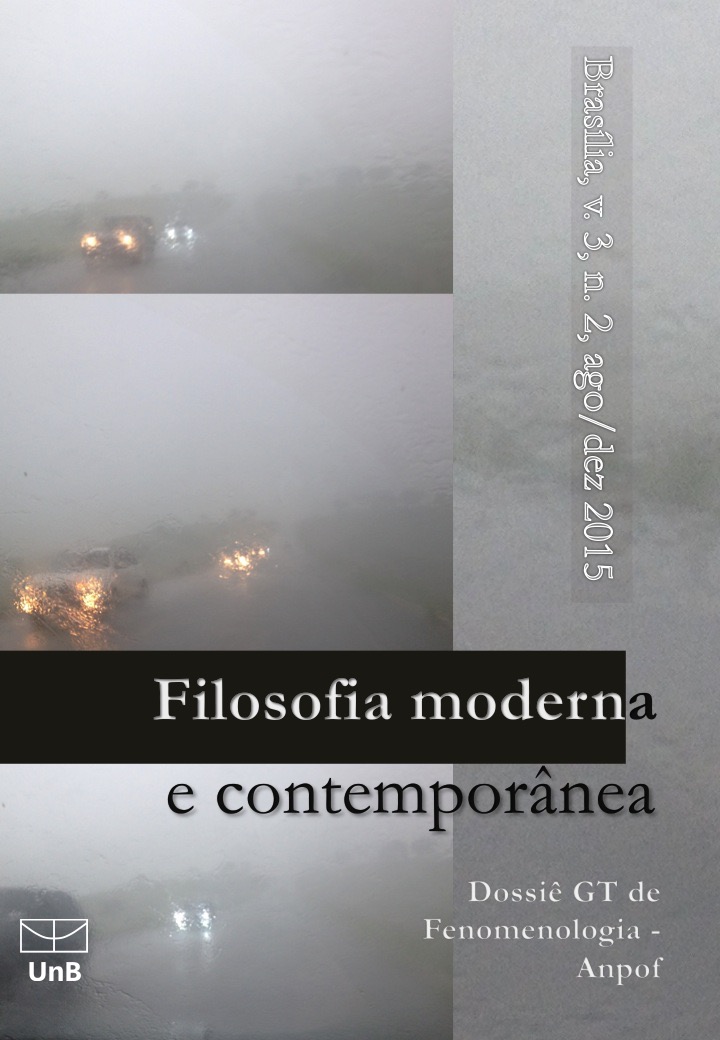Uma aproximação à noção de consentimento na fenomenologia da vontade de Paul Ricoeur: do enraizamento da liberdade
DOI:
https://doi.org/10.26512/rfmc.v3i2.12513Palabras clave:
Ricoeur, Vontade, Consentimento, LiberdadeResumen
O trabalho propõe uma aproximação à noção de consentimento tal como é elaborada por Paul Ricoeur em sua obra Philosophie de la volonté 1. Le volontaire et l’involontaire, publicada em 1950. Apresenta, em traços gerais, o contexto em que ela aparece ”“ o projeto de uma investigação fenomenológica da vontade ”“ e examina as dificuldades de sua apreensão e descrição eidética. Procura destacar a contribuição que ela pretende trazer para a compreensão do exercício da liberdade em situação, como parte do esclarecimento do que Ricoeur denomina de involuntário corporal absoluto, desdobrado em três dimensões: o caráter, o inconsciente e a vida. Sem acompanhar a minuciosa descrição que Ricoeur faz de cada umadessas dimensões, procura-se discernir o que significa propriamente consentir e indicar o problema colocado pela resposta de Ricoeur à pergunta “por que consentir?”.
Descargas
Citas
DASTUR, Françoise. “De la phénoménologie transcendantale à la phénoménologie herméneutique” in Greisch, J. and Kearney, R. (dir.) Paul Ricoeur : les métamorphoses de la raison herméneutique. Paris, Cerf, 1991, p.37-50.
DASTUR, Françoise. “Volonté et liberté selon Paul Ricoeur” in Ricoeur: Cahiers de l’Herne 1, Paris, Points, 2004, p.369-387.
DOSSE, François. Paul Ricoeur : les sens d’une vie. Paris, La Découverte, 1997.
DOSSE, François. Paul Ricoeur: un philosophe dans son siècle. Paris, Armand Collin, 2012.
GREISCH, Jean. “Préface” in Paul Ricoeur, Philosophie de la volonté 1. Le volontaire et le involontaire. Paris, Éditions Points, 2009, p.7-15.
GREISCH, Jean. "Les phénomènes du volontaire et de l’involontaire et la poétique de la liberté", in Paul Ricoeur: l’itinérance du sens. Grenoble, Jérôme Millon, 2001, P.29-51
KEARNEY, Richard. “Between Phenomenology and Hermeneutics”, in On Paul Ricoeur : the owl of Minerva. Aldershot/UK, Ashgate, 2004, p.13-32.
P I N T O R - R A M O S, A n t o n i o. “ Pa u l Ricoeur y la fenomenología” in Martínez, Tomás Calvo y Crespo, Remedios Ávila (eds.) Paul Ricoeur : los caminos de la interpretación. Barcelona, Anthropos, 1991, p.73-106.
RICOEUR, Paul. Du text à l’action: essais de herméneutique II. Paris, Seuil, 1986 (a).
RICOEUR, Paul. À l’école de la phénoménologie. Paris, Vrin, 1986 (b).
RICOEUR, Paul. “Resposta a Pintor-Ramos” in Martínez, Tomás Calvo y Crespo, Remedios Ávila (eds.) Paul Ricoeur : los caminos de la interpretación. Barcelona, Anthropos, 1991, p.107-111.
RICOEUR, Paul. Philosophie de la volonté 1. Le volontaire et le involontaire. Paris, Éditions Points, 2009 [1950].
Descargas
Publicado
Cómo citar
Número
Sección
Licencia
Los derechos de autor para artículos publicados en esta revista son del autor, con derechos de primera publicación para la revista. Debido a que aparecen en esta revista de acceso público, los artículos son de uso gratuito, con atribuciones propias, en aplicaciones educativas y no comerciales.


